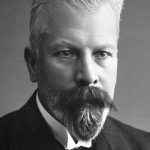Date of Birth: September 11, 1825
Zodiac Sign: Virgo
Date of Death: August 6, 1904
Biography
Eduard Hanslick was an influential Austrian music critic and writer, renowned for his pivotal role in the aesthetic and philosophical discourse on music in the 19th century. Born in Prague, Hanslick became a central figure in the Viennese musical scene, where his critical works and reviews had a profound impact on the development of musical aesthetics. He studied law at the University of Vienna but soon found his true calling in music and criticism. His seminal work, “On the Beautiful in Music” (Vom Musikalisch-Schönen), challenged the Romantic notion that music’s value lies in its emotional expression, instead advocating for the autonomy of musical beauty. Hanslick also contributed extensively to Viennese journals and became a staunch supporter of Brahms while often clashing with the proponents of Wagner’s music. His writings remain influential in musicology and aesthetic theory.
5 Interesting Facts about Eduard Hanslick
1. Eduard Hanslick was an early advocate of absolute music, arguing that music should be appreciated for its own sake rather than for its ability to express emotions or tell stories.
2. He was a close friend and supporter of composer Johannes Brahms, frequently promoting Brahms’s work in his critiques.
3. Hanslick’s critical stance made him a controversial figure, particularly among supporters of Richard Wagner, whose music he often criticized.
4. Despite his critical nature, Hanslick was a highly respected academic, holding a position at the University of Vienna where he lectured on the history and aesthetics of music.
5. His book “On the Beautiful in Music” is considered one of the cornerstones in the field of music aesthetics.
5 Most Interesting Quotes from Eduard Hanslick
1. “The essence of music is sound, not feeling.”
2. “Music has no power to express anything other than itself.”
3. “The value of a piece of music lies in its form and structure, not in any extramusical associations it may evoke.”
4. “The beautiful in music is that which pleases solely through the medium of the ear.”
5. “A true appreciation of music requires an understanding of its formal properties, not just an emotional response.”
Highest Net Worth Achieved
Eduard Hanslick’s net worth was not extensively documented, but as a prominent academic and critic in 19th-century Vienna, he would have been considered relatively well-off for his time, allowing him to live comfortably and maintain a position of influence in the cultural sphere.
Children
Eduard Hanslick did not have any children. His personal life was relatively private, and he remained dedicated to his professional pursuits in music criticism and aesthetics.
Relevant Links
1. [Eduard Hanslick – Encyclopedia Britannica](https://www.britannica.com/biography/Eduard-Hanslick
3. [On the Beautiful in Music – Full Text](https://archive.org/details/onbeautifulinmus00hansrich

